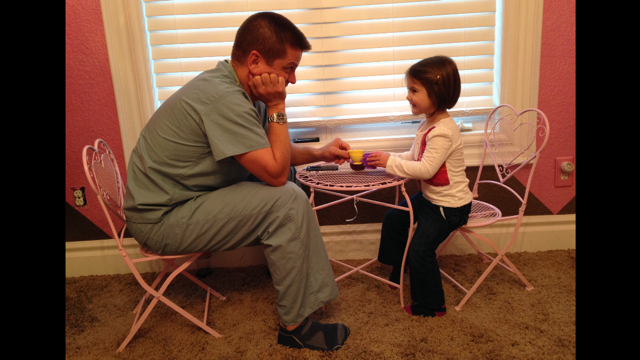
By Kimberly Steed, RN, MNSc. (woman, nurse, mother of 2 and wife of Dr. Steed)
The last few months I’ve been dealing with SEPARATION ANXIETY. Our oldest child, Glyn, never seemed to have an issue with me leaving or walking away. When and if he did, it was easily resolved. But that hasn’t been the case with our daughter Araceli.
Weekdays I have a sitter who watches her while I work, but every time I left the room she’d seem to have a panic attack! Strategically placed baby gates separate our home and as soon as I stepped over the gate, she suddenly started screaming and pleading, “Mommy, Mommy please don’t go!” It’s not only hard on her but also hard on me. I hated seeing her so upset, so I’d often try to stay with her longer — trying and hoping to her calm down.
Offers of rewards, delaying my exit, holding and hugging her never seem to calm her enough. I found myself getting more stressed, scolding her and even putting her in “time-out.” Over the last few weeks, her separation anxiety has improved and left me wondering if anything I’d done during those first few weeks might have made things worse.
Separation anxiety is a normal stage of development that starts at about 7 months of age. Normal separation anxiety is most common between the ages of 10-18 months and gradually disappears by 3 years of age. Separation anxiety may cause trouble with bedtime, resulting in an anxious, crying, and/or clinging little angel.
The severity and intensity of separation anxiety depends on how well the parent and child reunite, the child and the adult’s coping skills and how well the adult responds to the separation issue. A child of an anxious parent many times will be an anxious child. Separation anxiety is a normal stage of development and is only considered a mental health disorder in approximately 4%-5% of children and adolescents.
I wanted to know how to respond and what actions are helpful and appropriate when dealing with Araceli’s (our) separation anxiety. For a child with normal separation anxiety, here’s what I found:
- Practice Separating. Leave for brief periods at first.
- Plan separations after naps or feedings. Separation anxiety occurs more often when babies are tired or hungry.
- Make up a “goodbye” ritual. Having a ritual reassures your child and can be as simple as a special wave through the window.
- Keep things familiar. Have the sitter come to your home and when the child is away from home, have them take a familiar object with them.
- Keep the same primary caregiver. If you hire a caregiver try to keep him or her so your child is not constantly left with someone new.
- Make leaving simple. Tell your child when you are leaving and let them know that you plan to return and then GO. Don’t stall when it’s time to leave.
- Reassure and don’t give in. Reassure your child that he or she will be fine while you’re gone. Set limits to help your child adjust.
After doing some research, I stopped letting my daughter know in advance that I’d be leaving. Now I wait until it’s time to leave and I kneel down and tell her I’m leaving, but I’ll be back. I give her a kiss and tell her to be a good girl.
At first she would cry and ask me not to leave. Then she moved on to “I need to tell you something” but couldn’t remember what she wanted to say. 🙂 Then she started asking me “Mommy, you come back?” Most recently, she is simply waving “Bye, Mommy.” Success at last!
After doing a little homework on this, I’m betting Araceli’s separation anxiety was likely made worse by my initial reactions. Now that we’ve tackled separation anxiety, I guess we should move on to the next issues… Thumb Sucking and Potty Training! Fingers crossed.
Kimberly is married to Mercy physician Dr. Matthew Steed. Dr. Steed’s number one passion is to care for the pregnancy and birthing needs of women. You may call him at the Mercy clinic at 479-338-5555 to begin your prenatal care and let him help you enjoy your pregnancy journey. His office is located in the Mercy Physician’s Plaza just off Interstate 540 in Rogers.
 NWAMotherlode.com does not provide medical advice, diagnosis or treatment. This content is for informational purposes only and isn’t a substitute for professional medical advice. Always talk to your doctor if you have questions about a medical condition. Don’t delay getting professional medical advice because of something you read online. This website doesn’t necessarily recommend or endorse any specific tests, doctors, products, procedures or opinions discussed on the site.
NWAMotherlode.com does not provide medical advice, diagnosis or treatment. This content is for informational purposes only and isn’t a substitute for professional medical advice. Always talk to your doctor if you have questions about a medical condition. Don’t delay getting professional medical advice because of something you read online. This website doesn’t necessarily recommend or endorse any specific tests, doctors, products, procedures or opinions discussed on the site.





